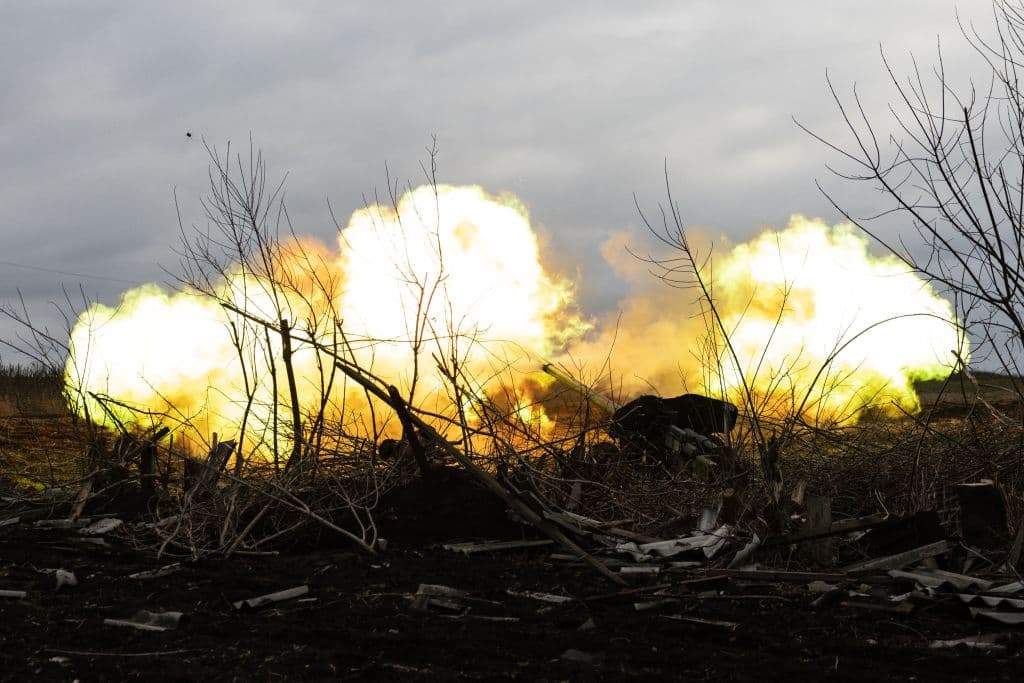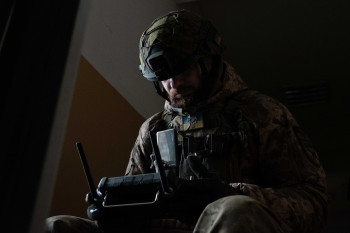Ukraine war latest: Kyiv expects Russia to lose up to 70,000 troops in the next 4-5 months

Key developments on Jan. 3:
- Ukraine’s intelligence: Russia to likely ‘continue offensive operations this year’
- Air Force: Ukraine has shot down nearly 500 drones launched by Russia
- Russia conducts more attacks on civilian areas in Donetsk Oblast
- Kuleba urges international sporting events to ban Russian athletes from competing after ice stadium destroyed
Russia will likely “continue offensive operations this year” even though it may lose tens of thousands of its soldiers in the months ahead, a representative of Ukrainian intelligence said on Jan. 3.
The Russians “understand that they are going to lose” on the battlefield, but they are not planning to end the war, Ukrainian military intelligence spokesman Andrii Cherniak said.
In a commentary for RBK-Ukraine, a Ukrainian media outlet, Cherniak said Ukraine’s intelligence is “sure” that Russia would still try to capture Donetsk Oblast and do whatever it takes to hold onto its land corridor on the southern coast to the Russian-occupied Crimea.
Ukraine anticipates that the Russian army will lose up to 70,000 more troops in the next 4-5 months, but the Kremlin appears to be “ready for such losses,” Cherniak added.
This latest intelligence assessment comes as senior Ukrainian officials warn that Russia could launch a major offensive from multiple directions in early 2023.
Cherniak also said Russian troops “may simultaneously attack from the north and the east,” but “such actions of the enemy are expected, and our troops are ready for it.”
Russia’s battlefield achievements remain limited, even as fierce battles raged in Ukraine’s east and south. Russian troops were forced to withdraw from 40% of Ukrainian territories they had occupied since the February invasion, Ukrainian Commander-in-Chief Valerii Zaluzhnyi said on Jan. 2.
Russia’s ‘enormous human resources’
Ukraine’s Deputy Defense Minister Hanna Maliar said that Russia appears unable to keep the same intensity of its offensive that it had early in the full-scale invasion, but it still has “enormous human resources” to continue the war against Ukraine.
“They may not be able to fight as intensely as they started, but they have enough reserves to fight this war,” Maliar said on television.
While Maliar said it was an achievement that Ukraine still “strongly holds” a part of Donetsk Oblast today, she acknowledged that “these are very difficult battles” that are “very tiring” for Ukrainian soldiers.
Russia now has hundreds of thousands of conscripts it can send to the front line. Ukraine’s Commander Valeriy Zaluzhnyi admitted in December that Russia’s mobilization of hundreds of thousands of troops in the fall “has worked,” and the conscripts are “a problem for us.” He estimated then that Moscow still has “a reserve of 1.2 – 1.5 million people.”
Anticipating that Russia would conscript more soldiers amid its stalled battlefield progress, Ukraine’s top defense officials recently said that Russian authorities were planning to close its borders for conscription-age men starting Jan. 5.
With difficult battles ahead, Ukraine needs “a powerful motivation, professionalism, and weapons” to keep up the defense in the embattled Donetsk Oblast, Maliar said.
Currently, the epicenter of the battle is around Bakhmut, a salt-mining city nearly emptied of its 70,000 residents.
While Moscow has massed its troops and equipment for half a year, Russian troops are unlikely to achieve “a significant breakthrough near Bakhmut in coming weeks,” the U.K. Defense Ministry said on Jan. 3.
Both sides are suffering “heavy casualties,” the ministry said, even if “the frequency of Russian assaults have likely (been) reduced from the peak in mid-December” due to Ukraine’s “significant reinforcements” to defend the Bakhmut sector.
Expelling Russian athletes
Meanwhile, farther from the front line in the town of Druzhkivka, a Russian strike nearly destroyed the Altair ice arena late on Jan. 2, Donetsk Oblast Governor Pavlo Kyrylenko reported. Two injuries were reported in Druzhkivka.
Condemning Russia’s missile attack as “another act of vandalism,” Ukraine’s Ice Hockey association said in a statement that this is the fifth ice stadium destroyed during the war, listing the previous ones as the stadiums in Kharkiv, Mariupol, Sievierodonetsk, and Melitopol.
The association said the sports facility in Druzhkivka was “completely empty” and “not a military target.”
Ukraine’s Foreign Minister Dmytro Kuleba condemned the attack, urging international sporting events to ban Russian athletes from competing.
"I invite all sports officials who want to allow Russian athletes to compete in international events because, as they say, 'politics should be kept out of sports,' to visit the Altair ice arena in Druzhkivka ruined by Russia’s 'politically neutral' shelling," Kuleba said in a Twitter post.
The Russian Defense Ministry admitted that it had struck Druzhkivska, claiming it destroyed Ukrainian military equipment and weapons stored near the town’s railway station.
Never-ending attacks
The city of Kramatorsk, Donetsk Oblast’s provisional capital, suffered from another missile strike on Jan. 3, wounding at least one person, according to Mayor Oleksandr Honcharenko.
Less than 24 hours ago, Russia’s strike on Kramatorsk wounded one person and damaged 34 houses and 8 apartment buildings, the Kramatorsk City Council said.
On Jan. 3, Russia also massed artillery fire on the town of Kurakhove, south of Kramatorsk.
Donetsk Oblast Governor Pavlo Kyrylenko reported that the artillery hit an apartment building in Kurakhove, killing at least one person and wounding two.
Neighboring buildings and a water supply facility were also damaged, Kyrylenko said, as he issued another urgent evacuation call for the remaining residents in Donetsk Oblast as Russia steps up its shelling of civilian areas.
In southern Ukraine, Kherson Oblast Governor Yaroslav Yanushevych said that two people driving in a car were killed by a landmine that Russian troops planted before their withdrawal in November.
Yanushevych urged residents to be cautious since a “very high” number of explosives remains in the liberated territories, adding that the work is underway to get rid of them safely.
Meanwhile, Ukraine’s air defense has reported shooting down all 84 drones that Russia launched at the country in the first two days of 2023.
Since September, Ukraine has shot down nearly 500 drones launched by Russia, according to the Air Forces.










